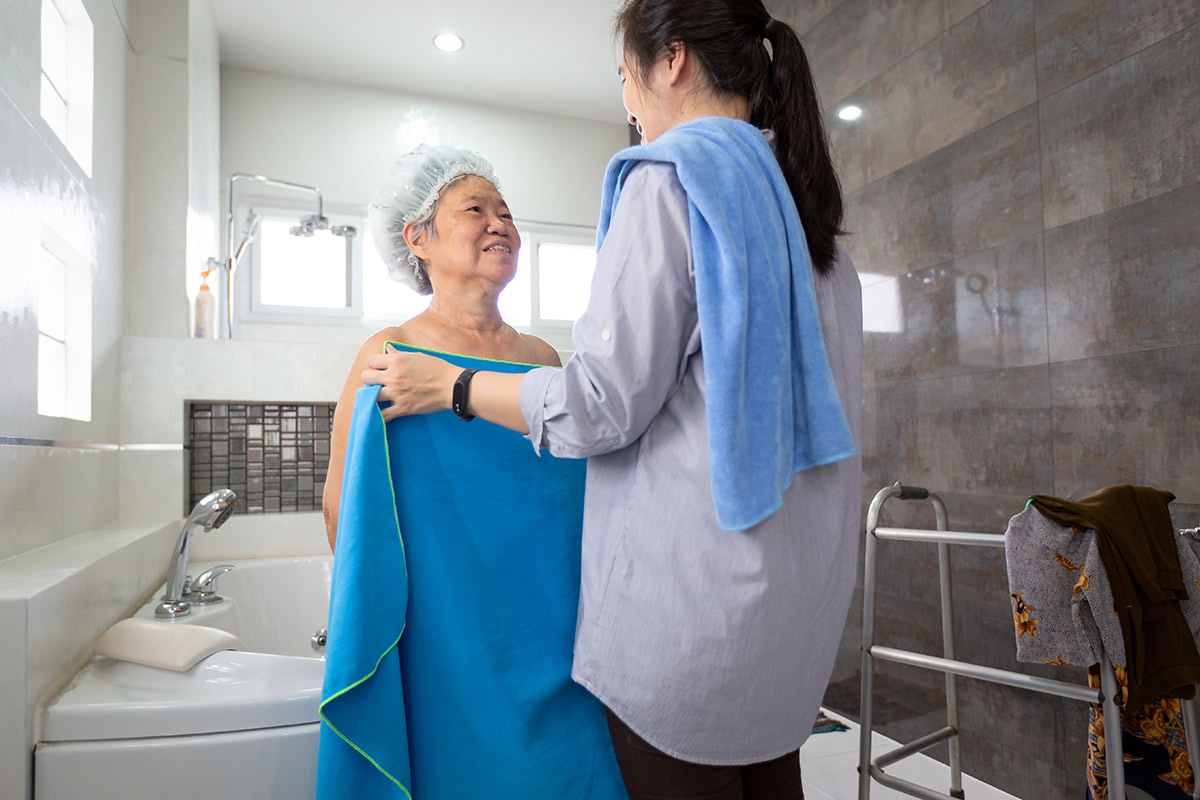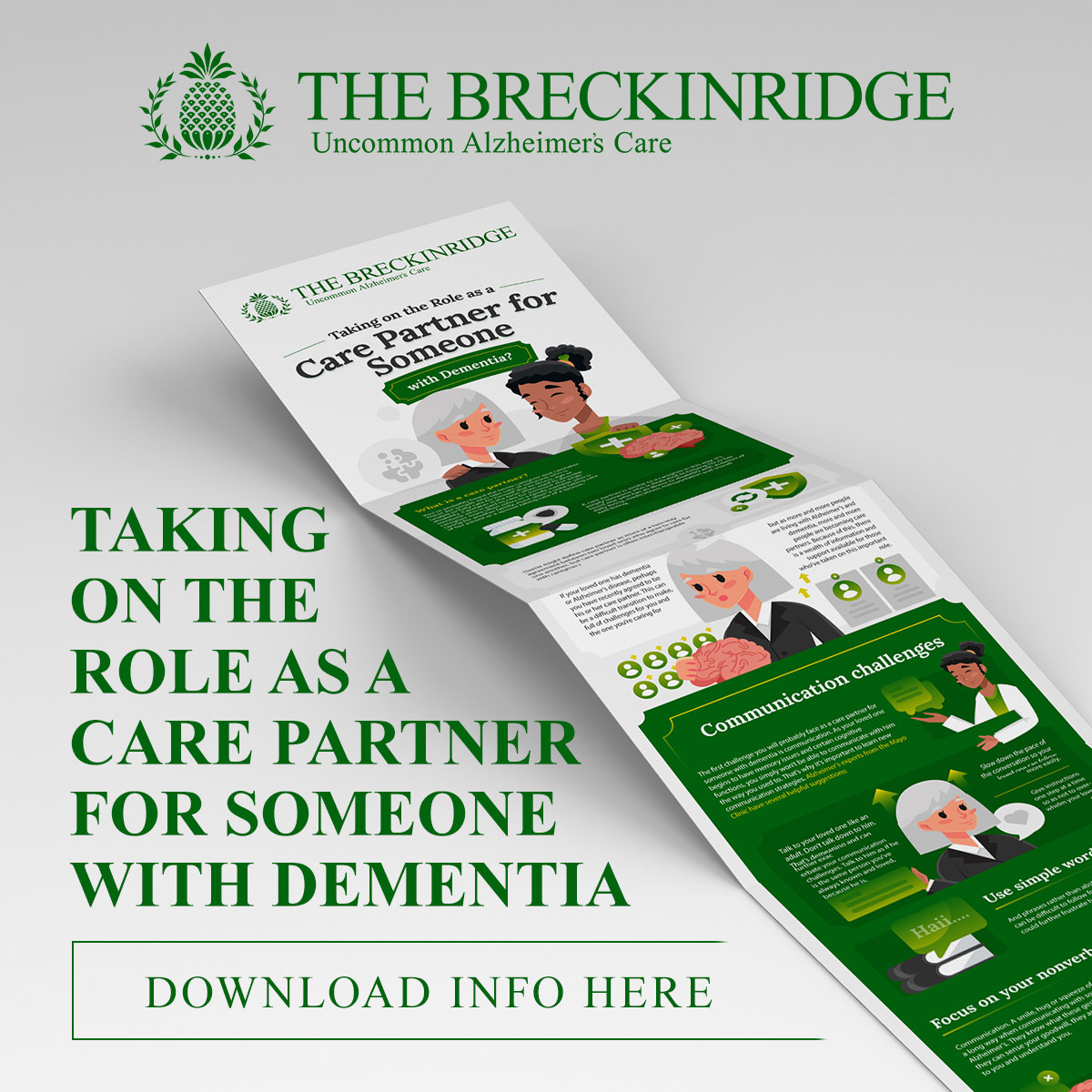Taking on the Role as a Care Partner for Someone with Dementia
Share this Infographic Image On Your Site
<p><strong>Please include attribution to https://thebreckinridge.com/ with this graphic.</strong><br><br><a href="https://thebreckinridge.com/ways-to-stay-engaged-socially-with-dementia/"><img src="https://thebreckinridge.com/wp-content/uploads/2022/11/2-taking-on-the-role-as-a-care-partner-for-someone-with-dementia-thebreckinridge.jpg" alt="Taking on the Role as a Care Partner for Someone with Dementia" width="1200px"></a></p>What is a care partner?

You’ve probably heard the terms caregiver and caretaker. These are people who take care of someone who is unable to fully care for himself due to illness, age or disability. Caretaker is the term often used to describe someone who is paid to care for someone else while caregiver more often refers to a family member who is caring for another family, most often a child taking care of her parent or a spouse taking care of a spouse.
A care partner is similar to a caregiver in this way. It’s simply someone who is dedicated to helping his or her loved one who has an illness or disability with activities of daily living, medications, transportation and overall well-being.
(Some might define care partner as more of a two-way agreement between two loved ones who agree to care for one another, but care partner is often interchangeable with caregiver.)
If your loved one has dementia or Alzheimer’s disease, perhaps you have recently agreed to be his or her care partner. This can be a difficult transition to make, full of challenges for you and the one you’re caring for, but as more and more people are living with Alzheimer’s and dementia, more and more people are becoming care partners. Because of this, there is a wealth of information and support available for those who’ve taken on this important role.
Communication challenges

The first challenge you will probably face as a care partner for someone with dementia is communication. As your loved one begins to lose his have memory issues and certain cognitive functions, you simply won’t be able to communicate with him the way you used to. That’s why it’s important to learn new communication strategies.
Alzheimer’s experts from the Mayo Clinic have several helpful suggestions:
Dealing with stress and distress

Stress and exhibiting signs of distress are common for those living with Alzheimer’s and dementia because their world has been turned upside-down. Especially if the disease is progressing quickly, this can be very disorienting. They may use frustration, anger or agitation to communicate that they are in pain or need something.
Learning why your loved one is showing signs of distress or agitation is important. Don’t assume the answer is they’re “losing their minds.” Most likely, they are trying to communicate something to you. They just don’t know how. Determine what their current need might be and meet it as best you can. As you continue to care for your loved one, you will better be able to decode their stress signals.
Physical challenges

At some point you will likely have to help your loved one with activities of daily living (ADLs) such as dressing, bathing and going to the bathroom. This can be hard for the caretaker and the one being cared for. We are used to being independent and able to care for ourselves. When we can’t, that’s a difficult reality to face. You may both feel shame on some level for having to assist, or need assistance, in this area. This is a normal part of the disease process.
The Alzheimer’s Association in the UK offers excellent resources on how to care for a loved one and their physical needs, including advice and tips for washing and dressing and incontinence.
If the ADLs are too taxing on you physically or emotionally, consider bringing in help. This can be a professional caregiver you hire or a fellow family member who can assist in this area.
Personal challenges

One of the greatest challenges care partners face is caring for themselves. It’s easy to put the life of the person you’re caring for first. But you can’t care for someone else if you’re not caring for yourself.
Because this has been such a common challenge for caregivers, advocates for caregivers have developed the “caregiver’s bill of rights” to help caregivers prioritize their physical and mental health.
Caregivers’ Bill of Rights
I have the right . . .
You can read the rest of your bill of rights here.
With any other job, self-care is encouraged. Why would that not also be true, and especially true, for caregiving?
Part of caring for yourself may include finding support from other caregivers and care partners. There are numerous support groups for caregivers of Alzheimer’s and dementia. To find one near you, visit your local Alzheimer’s Association chapter.
Deciding on the future
Inevitably, you will have to decide what the best next step is for your loved one when his or her dementia has progressed to a certain point. Most people living with Alzheimer’s or dementia eventually need full-time, professional care. You will likely need to consider getting more help at home, or you will need to consider where your loved one will live. Memory care facilities like The Breckinridge exist for this transition and crucial next step in your loved one’s journey.
Read our article 5 Signs Your Loved One Requires Memory Care to learn more.
See this as an opportunity for growth
While being a care partner for someone living with dementia can be incredibly challenging, it can also be incredibly rewarding. You will get to know a new side of yourself and a new side of the one you’re caring for. Your relationship will be stretched and likely strengthened as you learn new ways to communicate. You will realize you’re capable of more than you thought, and you will rise to challenges you never thought possible.
As you face the challenges being a care partner can bring, stay open to the ways you are growing as a result, what you are learning and how your relationship with your loved one is deepening as you face this new chapter together.






